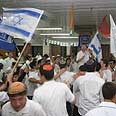
The rabbi's Hallel
Much of the confusion associated with Independence Day and Jerusalem Day stems from viewing reality through ideology-specific lenses
It is becoming increasingly apparent that certain circles within the National-Religious camp feel the same way. Last year before Independence Day, there was a lively debate regarding the correct attitude to Independence Day and Jerusalem Day (Jerusalem Day, which falls on the 28th of Iyar), particularly with reference to Hallel. At least one rosh yeshivah (dean) has even instructed his students to desist from celebrating the day altogether.
This year is no exception and three serious neo-National-Religious thinkers have circulated documents re-examining the practice – and they are unanimous in rejecting this approach. Some recommend saying the abridged form of Hallel without a beracha (blessing), while others favour dropping it altogether.
Disappointment with the State
It is illuminating to note that there is nothing new under the sun: this scenario was played out in the Haredi (ultra-Orthodox) world two generations ago. In 1949, with the memory of the great salvation and victory still fresh, Hallel was recited in the two leading Lithuanian-style Haredi yeshivas in the country, Ponevizh and Hevron. This was repeated in the ultra-Orthodox Zichron Moshe and Romema neighbourhoods of Jerusalem.The common denominator in each situation is a profound sense of disappointment with the State, as well as the perceived need, for educational reasons, to keep one’s distance from such a secular and “ungodly” system.
While certainly agreeing with these sentiments, I question whether an essentially Halachic issue can be determined based on subjective impressions or other constraints.
The Hanukkah precedent
The Talmud informs us that the Hallel prayer was instituted by the prophets to be said by the Jewish People on Festivals and in thanksgiving for their salvation after being saved from grave danger (Pesahim 117a).
Although 2170 years have passed, we continue to celebrate Hannukah, the short-lived victory over the Greco-Syrians and their home-grown Hellenist supporters (so reminiscent of parts of today’s Establishment). Although the Jews rededicated the Mikdash (Temple), the revolt’s central achievement – religious freedom and the supremacy of the Torah in Jewish life – evaporated within two generations as the Hellenists regained control and persecuted and killed Jews who held primary allegiance to the Torah.
Despite this, the Sages never suggested that Hanukkah be abolished, or that the recitation of Hallel be discontinued. The reason for this is that Hanukkah celebrates the events and salvation of the Jewish People at a specific historical juncture; the Divine salvation that our forefathers experienced is an immutable fact independent of subsequent developments. The same Halachic reasoning applies for Independence Day and Jerusalem Day: the former commemorates the salvation of 1948, the latter of 1967
The case for Al HaNissim
The soul-searching in some quarters of the National-Religious camp is a blessing in disguise. I have always felt that the adulation of the State not uncommon in National-Religious society is a form of idol-worship – a kind of Torah fascism – and it is high time that this be addressed.
In their efforts to delineate a more balanced approach, the authors mentioned above propose something that I have been advocating for years: that a special version of the Al HaNissim (“for the miracles”) prayer - added to the Amidah (silent prayer) and Birkath HaMazon (Grace after Meals) on Purim and Hanukkah - be adopted for Independence Day and Jerusalem Day.
The authors note correctly that even those who dispute the recitation of Hallel would have little choice but to admit that the addition of Al HaNissim is Halachically unassailable.
In fact, I would go further. The beracha “She’Assah Nissim” – said on days commemorating great national salvations – is entirely appropriate for Independence Day and Jerusalem Day. Surely our reconstitution as a sovereign nation is a greater milestone in our history than the events of Purim that are universally celebrated.
Ideology vs Halachah
Much of the confusion associated with Independence Day and Jerusalem Day stems from viewing reality through ideology-specific lenses. Not infrequently, ideologies, or “hashkafoth” as they are known in the yeshivah world, tend to add background noise to Torah discussions; rather than clarify, they often serve only to obfuscate.
The Torah trains us and requires us to block out the static and examine the issue before us as objectively as humanly possible. This is no simple matter. Rabbis too are susceptible to prejudice and inclination, but this does not justify painting an Halachic canvas with an ideological brush.
Note: The Beth HaWaad beth din of Machon Shilo has recently published a suggested text for Al HaNissim at www.machonshilo.org.
Rabbi David Bar-Hayim is the head of Machon Shilo and the Beth HaWaad religious court that ruled that Askenazim can eat kitniyot on Passover










